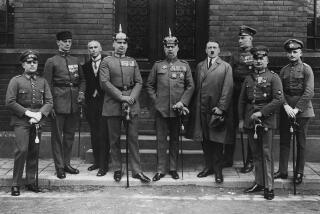BRINGING THE LYONS BUTCHER TO THE SCREEN
- Share via
NEW YORK — Marcel Ophuls, acknowledged as one of the world’s foremost documentary makers, is given to obsessions and this new obsession is his most ambitious project. For more than two years, he has been consumed with putting the life and times of 73-year-old Nazi war criminal Klaus Barbie on the screen. Lugging camera equipment to three continents, Ophuls has been uncovering the Gestapo leader’s secrets in Germany, France, Bolivia and Peru.
“Making this film,” Ophuls said from Paris, “is like an intense fight for the survival of memory itself. I want Barbie to be judged so that what he did is burned into history and will never happen again.”
Ophuls and his tiny crew have tracked down people who supposedly knew Barbie and coaxed them to talk on camera--the torturers, the survivors of the death camps, French collaborators, Barbie’s shady Bolivian arms trafficking partners, former American intelligence officers who recruited Barbie as a spy in postwar Germany.
While struggling with the daunting task of condensing 97 hours of film into 2 1/2 hours, Ophuls, 59, is also agonizing about a more formidable problem: making a documentary about an event that is still taking place. If the long-awaited trial of the Butcher of Lyons begins May 11, Ophuls said he will have to leave the editing room and return to Lyons--the scene of the crimes and the trial. He will have to shoot and integrate more footage into “Hotel Terminus: The Life and Times of Klaus Barbie.”
The Samuel Goldwyn Co. will distribute the film in the U.S.; Orion Pictures International holds overseas rights.
Since Barbie’s secret expulsion from Bolivia to France in 1983, many French have speculated that he will never stand trial and will remain in St. Joseph Prison--near the Hotel Terminus, the Gestapo headquarters where Barbie conducted torture and where Ophuls conducted interviews.
At the trial, Barbie and his lawyer, Jacques Verges, the enfant terrible of the French Left, are expected to make embarrassing accusations about French collaboration during the Occupation and point the finger at prominent French politicians and businessmen who helped carry out the Final Solution.
“The French are not the only ones who may be embarrassed by l’affaire Barbie, “ Ophuls said. At the moment, he was editing segments related to the U.S. Counter Intelligence Corps, the forerunner of the CIA, which employed Barbie four years as an informer while he was hunted by the French.
The U.S. government provided Barbie and his family with character references and false papers (with the identity Klaus Altmann) and organized their escape via the so-called Rat Line to South America.
The iconoclastic Ophuls is no stranger to controversy. His award-winning “The Sorrow and the Pity” (1972), about French collaboration with the Nazis, was a landmark. French television banned it for nine years because it threatened to “cure” French historical amnesia, revealing that many French under the Vichy regime embraced Nazism. Another jolting documentary, “The Memory of Justice” (1976), probed moral issues raised by the Nuremburg trial, Vietnam and Algeria.
“I’m a German Jew with French and American nationality--the classic wandering Jew,” Ophuls said. He recalled spending his childhood fleeing Hitler. His father, famed director Max Ophuls (“Lola Montes,” “La Ronde”), fled Frankfurt with his family in 1933, first to Paris, then Hollywood.
“The Barbie idea came from a transatlantic phone call in 1984, from the editor of the Nation to see if I’d cover the Barbie trial,” Ophuls said. “While doing pretrial research and interviews, I realized the story should be told with a camera.”
An American, John S. Friedman, a former professor of literature, contacted him and offered to produce the film. “I was stunned when French investors--the logical supporters of the project--gave us the cold shoulder,” said Friedman. He has raised about $750,000 of the $1-million budget--all from Americans.
He joined forces with Hamilton Fish III, who produced “Memory of Justice” with L.A. businessman Max Palevsky. They let Ophuls start filming--gambling that the trial would be repeatedly delayed by the French.
“Every few weeks there was a rumor the trial was imminent,” said Ophuls. “Then rumors the trial was too politically explosive and would never be held; then rumors that key witnesses and Barbie were in failing health. Should we wait or should we roll? We decided to roll.”
Ophuls, Friedman, a soundman, a cameraman and a translator/researcher met in Peru in June, 1985.
“We captured some emotionally charged interviews with the key figures in Barbie’s life--interviews that we might not have gotten if we’d waited for the trial,” said Ophuls. In any case, only a government camera will be allowed in the courtroom, and the film will not be released for twenty years. Like the 1962 Eichmann trial, “Barbie’s trial will influence the way a generation judges history,” Ophuls said.
The star of the film waits in St. Joseph’s Prison in Lyons, where he is frequently moved from cell to cell on the floor he occupies. Although the French condemned him to death in absentia in 1952 and 1954, under French law, Barbie can no longer be prosecuted for war crimes committed more than 20 years ago. So he prepares for his trial, accused of “crimes against humanity”--ordering the killing of 4,000 people and sending 7,500 French Resistance fighters and Jews to concentration camps.
Although Barbie agreed to let Ophuls interview him in prison, the French government has blocked all attempts. Ophuls has decided to use Bolivian TV footage of Barbie taken on the military transport plane that returned him to French territory.
“We tried interviewing everyone who was part of the Barbie story--we didn’t turn the camera off because we didn’t know what they would reveal,” said Ophuls.
It took months of research.
“Barbie is a subject few want to discuss, especially not with ‘The Sorrow and The Pity.’ Some of the interviews left me emotionally drained.”
Sometimes he had to mask his disgust when facing unrepentant Nazis or Bolivian military officials who he believed had protected Barbie. And now at the Paris Billancourt Studios, Ophuls is “reliving the experiences in front of the editing-room screen.”
Ophuls spent many hours interviewing Serge and Beate Klarsfeld --the Nazi-hunting couple who made this Barbie documentary and the trial a reality. They waged a lonely 11-year campaign to bring Barbie to justice, finally forcing a new civilian Bolivian government to allow Barbie’s expulsion.
Barbie’s most heinous crime was sending 44 Jewish children and seven adults to the ovens of Auschwitz, Klarsfeld said from Paris. “It was for them that we tracked down and unmasked Barbie--and brought him back to the scene of the crime.”
Lawyer Klarsfeld will represent most of the Jewish plaintiffs when the Barbie case opens.
“At the trial, justice will be memory in action,” he said. Jacques Verges, Barbie’s lawyer, has also defended members of Germany’s notorious Baader-Meinhof gang and Arab terrorists.
“It was essential we retrace Barbie’s steps in Bolivia and Peru,” said Ophuls. “Barbie joined the Diaspora of the Torturers--the guilty ones who ran for cover because they committed the crimes.” Ophuls and his crew spent two weeks in Bolivia and Peru, learning about Barbie’s 32 years in the South American Nazi network. Barbie worked closely with top Bolivian military officials and cocaine barons.
Barbie established such powerful governmental contacts, he was made an honorary colonel in the Bolivian Army and had an office in the Ministry of Interior. Ophuls and his crew even ventured to Santa Cruz, headquarters of Bolivia’s cocaine king, Roberto Suarez, who hired Barbie as “security consultant” for his private army.
Ophuls tried to speak with Suarez and other Barbie “business” associates.
“We were in Barbie territory and a story was there, but no one dared talk. We were afraid to stay,” said Friedman.
But in La Paz and Cochabamba, Ophuls managed to film Bolivian generals who worked with Altmann (Barbie), his arms-smuggling partner and henchman, and a political prisoner who saw Barbie supervising while she was being tortured.
After “Hotel Terminus”?
“No more documentaries,” Ophuls said. “I’d love to make films with actors, who get paid for storytelling--a comedy would be a relief.”
More to Read
Only good movies
Get the Indie Focus newsletter, Mark Olsen's weekly guide to the world of cinema.
You may occasionally receive promotional content from the Los Angeles Times.










